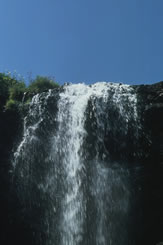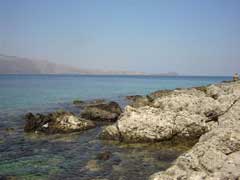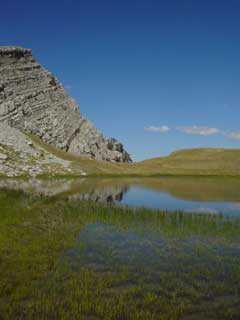 Arab region: water and land media workshop achieves immediate follow-up action
Arab region: water and land media workshop achieves immediate follow-up action
Egypt’s Ministry of Water Resources and Irrigation will organize a second capacity development workshop with journalists from all the Nile basin countries. Together with other Arab and UN organizations it will also facilitate the setting up of a platform connecting the various networks of journalists who work on water, land, environment, health and food in the region. These were the main outcomes of the first Capacity Development Workshop for Water and Environmental Journalists in the Arab Countries on the important topic of Water & Land in Egypt from 22-24 January 2009.
“Networking of media for improving water management in the Arab world is an important outcome of this workshop. Media play an important role in educating children as well as the politicians. Together we should invest and prepare the people, without that water and irrigation technologies will not work. I am glad to see your enthusiasm to move ahead. This is a good start for a better future. When you return to your countries you are our ambassadors for the Arab water world”, Deputy Minister Hussein I. El-Atfy told the journalists at the handing over of the workshop certificates.
More than 20 journalists from seven countries in the Arab region actively shared their views and contributed to the programme. They also recommended a range of follow up actions for various agencies in this region which is the most water scarce in the world. The meeting was co-organized by the UN-Water Decade Programme on Capacity Development (UNW-DPC), the United Nations Convention to Combat Desertification (UNCCD) and the Arab Water Council (AWC). The International Development Research Centre (IDRC), Middle East/North Africa Regional Office and Desert Research Centre also provided support to the workshop. Five international instructors facilitated the outcomes of the workshop. IRC’s Dick de Jong helped design the programme and contributed three sessions.
Media people from seven countries participated in this three-day workshop at the Regional Training Centre hosted at the Ministry of Water Resources and Irrigation, in 6 October City, Cairo, Egypt. They were from Algeria, Egypt, Jordan, Lebanon, Morocco, Sudan and Yemen and coming from different
media: radio (2), television channels (1), internet based institutes (1), national news agencies (2), newspapers (8), magazines (3), journalists networks (4) and communication staff from governmental institutions (2).
Media have an important role to play:
The media have an important role to play in educating the public, in advocacy and in providing guidance on the need to conserve water and avoiding further land degradation. All players in these sectors should learn more about what journalists do. Articles on water are everywhere, on TV, in newspapers and blogs.
The main objective of the workshop was to create awareness among media professionals in Arab countries regarding the current situation on water resources management and land degradation in the region, and to seek active involvement of the media for creating public awareness and advocacy to promote sectoral reforms to support the Millennium Development Goals and the Convention to Combat Desertification. The expectation is that with increased media attention to these issues, there will be more public awareness, which in turn, will draw more intensified attention from decision-makers.
“Thank you for the knowledge we required and the brainstorming. We benefitted much from this workshop and learned creative approaches. You achieved your ultimate objective. Many new issues were presented to us, and the importance of linking media, scientific people and policy and decision makers to work together for the wellbeing of the people”.
Essam Al Din Abd Al, Al Gomhoria Daily Newspaper, during the closing session.
Recommendations from the workshop:
Recommendations from the workshop include:
- Preparation of a specific website on land and water in Arabic and English
where information/articles from the journalists could be posted, as well
as a database on progress on the global checklist that the media could
use to evaluate efforts of their governments to meet the water,
sanitation and land challenges. This could form the basis for an
increased dialogue with all the stakeholders in the region.
- Establishment, development and management of alternative ways of sharing
information and articles prepared on land and water such as blogs and
other kinds of social networks and electronic fora.
- Follow up should be handed over to the region; it is proposed that the
Arab Water Academy set up a capacity building programme for Water,
Environment, and Health journalists. The Arab Water Council will discuss
this issue in its next board meeting. This will include establishing an
active media network in the region.
It was also recommended to link these activities with the existing networks such as the Arab Association of Science Journalists in order to avoid duplication, and the group should be expanded.
UNCCD announced that it is organizing a number of training sessions for journalists leading up to Desertification Day on 17 June around the theme “Conserving land and water = securing our common future”.
Working in three groups (Egypt, other countries in the region and the French journalists from Algeria and Morocco) the participants developed a list of media activities they will undertake with new knowledge and information from this workshop relating to water and land events in the coming year. The first one is around World Water Day on 22 March, the second is around Desertification Day on 17 June.
Field trip
On the last day the participants visited the Cairo-Alexandria Desert Road where contrasts of agricultural practice and water management was observed.
Dr. Hassan Hendy, member of the Desert Research Center, explained to the
journalists: “In this area we can see examples of different agricultural practices with different consequences.
There are banana plantations that bring good income in short time but cause land degradation, soil salinitation and exhaustion of the underground water. By contrast you also see here olive and date palm plantations that support the sustainable development in the newly reclaimed areas.”
| Contact information | n/a |
|---|---|
| News type | Inbrief |
| File link |
http://www.irc.nl/page/46756 |
| Source of information | IRC |
| Subject(s) | INFORMATION - COMPUTER SCIENCES , METHTODOLOGY - STATISTICS - DECISION AID , POLICY-WATER POLICY AND WATER MANAGEMENT |
| Geographical coverage | Egypt |
| News date | 25/02/2009 |
| Working language(s) | ENGLISH |
 you are not logged in
you are not logged in





